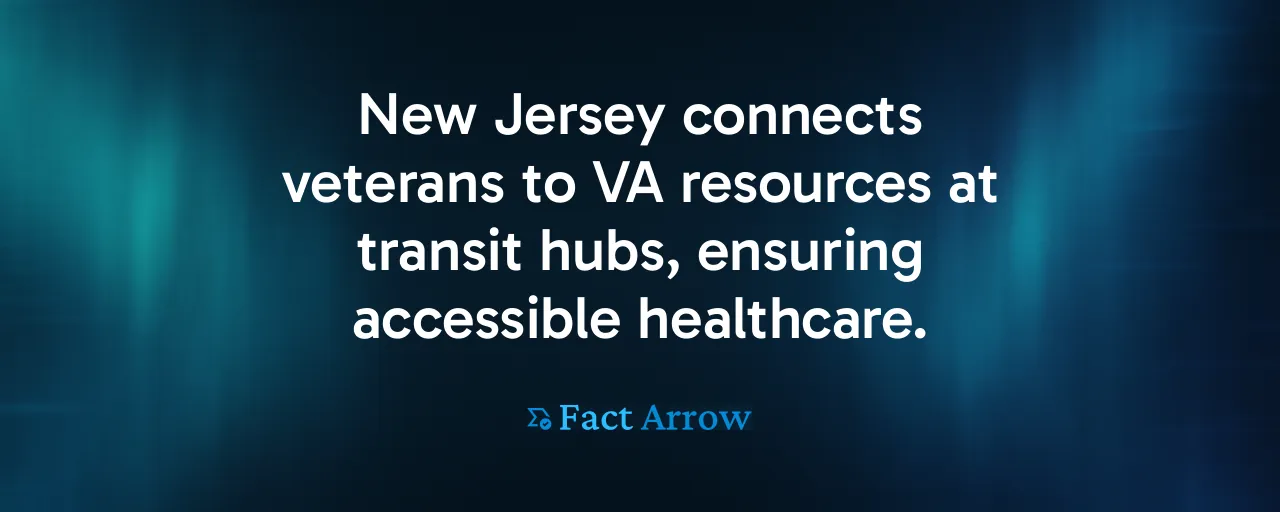A Lifeline on the Road
Veterans traveling New Jersey's highways or trains now encounter a powerful resource. As of July 2025, the state's transportation agencies have rolled out a campaign to post Veterans Affairs flyers at 21 Turnpike and Parkway service areas, the Farley Service Plaza, and NJ TRANSIT stations. These posters connect veterans to telehealth services, nearby VA facilities, and the 24/7 Veterans Crisis Line, offering immediate support for those in need. The initiative, backed by Governor Phil Murphy, aims to ensure no veteran feels alone, whether they're local or just passing through.
This effort taps into a broader movement to make healthcare accessible where people already are. High-traffic transit hubs, buzzing with travelers, serve as ideal spots to reach veterans who might not otherwise seek help. The campaign prioritizes those who served, ensuring they know care is a call or click away, no matter their location. It's a practical step to meet veterans on their terms, blending convenience with compassion.
Breaking Down Barriers With Telehealth
The cornerstone of this campaign is the VA's 'Anywhere-to-Anywhere' Telehealth Practice Authority. This federal rule, finalized in 2018, allows VA clinicians to treat veterans across state lines using VA Video Connect. For veterans, especially those with mobility issues or living in rural areas, this means healthcare without the burden of long drives. In 2025, the VA delivered 7.7 million telehealth visits, a 12 percent jump from the previous year, with 93 percent of veterans reporting satisfaction with video visits.
Telehealth is a game-changer for low-income or disabled veterans who struggle to reach clinics. New Jersey's decision to maintain payment parity for telehealth services ensures providers are incentivized to offer virtual care. By bringing these resources to transit hubs, the state makes it easier for veterans to access consistent, high-quality care, whether they're commuting or traveling far from home.
Mental Health in Focus
The Veterans Crisis Line, highlighted on these posters, addresses a critical need. Veteran suicide rates remain a pressing concern, and immediate access to trained responders can make all the difference. The 24/7 service offers free, confidential support, helping veterans and their families navigate moments of crisis. Placing this information in busy transit hubs normalizes seeking help, chipping away at the stigma that often prevents veterans from reaching out.
Research backs this approach. A 2025 study in JAMA Network Open found that VA telehealth staffing improvements led to better health outcomes, like improved blood pressure control, without widening racial disparities. By prioritizing mental health resources in public spaces, New Jersey's campaign ensures veterans know support is always within reach, fostering a culture of care and connection.
A Legacy of Support
New Jersey's commitment to veterans builds on years of progress. In the mid-2010s, the state piloted telehealth programs, including a 2017 grant to Virtua for veteran-focused virtual care. Nationally, the VA's telehealth visits surpassed one million by 2018, driven by the MISSION Act's push for expanded care options. These efforts reflect a growing recognition that veterans need flexible, accessible healthcare tailored to their unique challenges.
The state's transportation agencies are uniquely positioned to amplify this work. With millions passing through Turnpike rest stops and NJ TRANSIT stations annually, these hubs offer unmatched visibility. By partnering with the VA, New Jersey leverages its infrastructure to serve those who served, ensuring veterans encounter life-saving resources in their everyday travels.
Challenges and Opportunities
Despite its promise, the campaign faces hurdles. Rural veterans often lack reliable broadband, limiting telehealth's reach. Congressional debates over Medicaid and VA funding could strain resources, while clinician shortages persist nationwide. New Jersey's posters are a start, but they can't fully address these systemic gaps. Expanding state grants for community clinics and investing in rural broadband could bridge these divides, ensuring every veteran benefits.
Privacy is another concern. Veterans using public Wi-Fi at rest stops need secure connections for telehealth visits. The VA is refining privacy measures, but transit agencies could enhance impact by offering quiet spaces or staff training to guide veterans to resources. These steps would make the campaign visible and truly effective.
A Call to Build on Progress
New Jersey's initiative is a bold step toward ensuring veterans get the care they deserve, wherever they are. By placing VA resources in transit hubs, the state meets veterans where they're at, offering telehealth and crisis support that can save lives. The campaign's success hinges on continued investment in healthcare infrastructure, from broadband to clinician staffing, to reach every corner of the state.
This effort also sets a model for other states. Public spaces, from highways to train stations, can double as platforms for social good. Expanding telehealth flexibilities and integrating mental health screenings in transit settings could amplify impact, creating a network of support for veterans nationwide.
Veterans have given so much. New Jersey's campaign reminds us that their health and well-being are non-negotiable. By building on this foundation, we can honor their service with care that's accessible, equitable, and unwavering, no matter where the road takes them.
